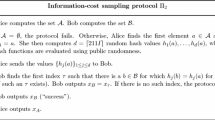Abstract
Assume that distributions \(X_0,X_1\) (respectively \(Y_0,Y_1\)) are \(d_X\) (respectively \(d_Y\)) indistinguishable for circuits of a given size. It is well known that the product distributions \(X_0Y_0,\,X_1Y_1\) are \(d_X+d_Y\) indistinguishable for slightly smaller circuits. However, in probability theory where unbounded adversaries are considered through statistical distance, it is folklore knowledge that in fact \(X_0Y_0\) and \(X_1Y_1\) are \(d_X+d_Y-d_X\cdot d_Y\) indistinguishable, and also that this bound is tight.
We formulate and prove the computational analog of this tight bound. Our proof is entirely different from the proof in the statistical case, which is non-constructive. As a corollary, we show that if X and Y are d indistinguishable, then k independent copies of X and k independent copies of Y are almost \(1-(1-d)^k\) indistinguishable for smaller circuits, as against \(d\cdot k\) using the looser bound.
Our bounds are useful in settings where only weak (i.e. non-negligible) indistinguishability is guaranteed. We demonstrate this in the context of cryptography, showing that our bounds, coupled with the XOR Lemma, yield straightforward computational generalization to the analysis for information-theoretic amplification of weak oblivious transfer protocols.
Supported by the European Research Council (ERC) under the European Union’s Horizon Europe research and innovation programme (grant agreement No. 101042417, acronym SPP), by ISF grant 18/484, and by Len Blavatnik and the Blavatnik Family Foundation.
Access this chapter
Tax calculation will be finalised at checkout
Purchases are for personal use only
Similar content being viewed by others
References
Barak, B., Hardt, M., Kale, S.: The uniform hardcore lemma via approximate bregman projections. In: Mathieu, C. (ed.) Proceedings of the Twentieth Annual ACM-SIAM Symposium on Discrete Algorithms, SODA 2009, New York, NY, USA, 4–6 January 2009, pp. 1193–1200. SIAM (2009). http://dl.acm.org/citation.cfm?id=1496770.1496899
Damgård, I., Kilian, J., Salvail, L.: On the (im)possibility of basing oblivious transfer and bit commitment on weakened security assumptions. In: Stern, J. (ed.) EUROCRYPT 1999. LNCS, vol. 1592, pp. 56–73. Springer, Heidelberg (1999). https://doi.org/10.1007/3-540-48910-X_5
Dodis, Y., Jain, A., Moran, T., Wichs, D.: Counterexamples to hardness amplification beyond negligible. In: Cramer, R. (ed.) TCC 2012. LNCS, vol. 7194, pp. 476–493. Springer, Heidelberg (2012). https://doi.org/10.1007/978-3-642-28914-9_27
Fehr, S., Vaudenay, S.: Sublinear bounds on the distinguishing advantage for multiple samples. In: Aoki, K., Kanaoka, A. (eds.) IWSEC 2020. LNCS, vol. 12231, pp. 165–183. Springer, Cham (2020). https://doi.org/10.1007/978-3-030-58208-1_10
Goldreich, O., Nisan, N., Wigderson, A.: On Yao’s XOR-lemma. Electron. Colloquium Comput. Complex 2(50) (1995). http://eccc.hpi-web.de/eccc-reports/1995/TR95-050/index.html
Holenstein, T.: Key agreement from weak bit agreement. In: Gabow, H.N., Fagin, R. (eds.) Proceedings of the 37th Annual ACM Symposium on Theory of Computing, Baltimore, MD, USA, 22–24 May 2005, pp. 664–673. ACM (2005). https://doi.org/10.1145/1060590.1060689
Hollander, F.: Probability theory: the coupling method (2012)
Impagliazzo, R.: Hard-core distributions for somewhat hard problems. In: 36th Annual Symposium on Foundations of Computer Science, Milwaukee, Wisconsin, USA, 23–25 October 1995, pp. 538–545. IEEE Computer Society (1995). https://doi.org/10.1109/SFCS.1995.492584
Kontorovich, A.: Obtaining measure concentration from Markov contraction. Markov Process. Related Fields 18(4), 613–638 (2012)
Levin, L.A.: One-way functions and pseudorandom generators. Combinatorica 7(4), 357–363 (1987). https://doi.org/10.1007/BF02579323
Maurer, U., Tessaro, S.: A hardcore lemma for computational indistinguishability: security amplification for arbitrarily weak PRGs with optimal stretch. In: Micciancio, D. (ed.) TCC 2010. LNCS, vol. 5978, pp. 237–254. Springer, Heidelberg (2010). https://doi.org/10.1007/978-3-642-11799-2_15
Renner, R.: On the variational distance of independently repeated experiments. CoRR abs/cs/0509013 (2005). http://arxiv.org/abs/cs/0509013
Wullschleger, J.: Oblivious-transfer amplification. In: Naor, M. (ed.) EUROCRYPT 2007. LNCS, vol. 4515, pp. 555–572. Springer, Heidelberg (2007). https://doi.org/10.1007/978-3-540-72540-4_32
Author information
Authors and Affiliations
Corresponding author
Editor information
Editors and Affiliations
Rights and permissions
Copyright information
© 2022 The Author(s), under exclusive license to Springer Nature Switzerland AG
About this paper
Cite this paper
Geier, N. (2022). A Tight Computational Indistinguishability Bound for Product Distributions. In: Kiltz, E., Vaikuntanathan, V. (eds) Theory of Cryptography. TCC 2022. Lecture Notes in Computer Science, vol 13748. Springer, Cham. https://doi.org/10.1007/978-3-031-22365-5_12
Download citation
DOI: https://doi.org/10.1007/978-3-031-22365-5_12
Published:
Publisher Name: Springer, Cham
Print ISBN: 978-3-031-22364-8
Online ISBN: 978-3-031-22365-5
eBook Packages: Computer ScienceComputer Science (R0)




